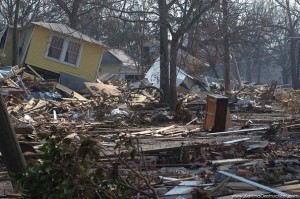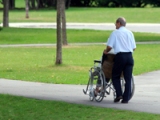 Crouched behind the sofa my five-year old grandson delighted in jumping from behind to scare his family. He would often accompany the surprise lurch with a growl, clawed fingers extended and a fantom face that was supposed to terrorize anyone that he felt was vulnerable. Both his parents and I were on to his game and we knew that when he crawled behind the sofa that an attack was imminent. His grandfather, however, never quite understood or appreciated the game.
Crouched behind the sofa my five-year old grandson delighted in jumping from behind to scare his family. He would often accompany the surprise lurch with a growl, clawed fingers extended and a fantom face that was supposed to terrorize anyone that he felt was vulnerable. Both his parents and I were on to his game and we knew that when he crawled behind the sofa that an attack was imminent. His grandfather, however, never quite understood or appreciated the game.
Each time Seb lurched to terrorize myself or his parents, we would fain surprise to his delight. Grandpa, on the other hand, was genuinely caught off guard each time his grandson emerged from the back of his hiding spot. Grandpa was never prepared for the attack. After a few times of having Seb catch Grandpa off balance, we had to limit Seb’s attacks. Grandpa was off bounds in allowing these surprises.
Last year, while Grandpa and my husband, Frank, was in the hospital awaiting surgery on his broken hip and leg, I read Ben Sherwood’s book, The Survivors Club. The thing emphasized again and again by Sherwood is that people who prepare for survival usually do survive accidents and bad events.
As we approach the tenth anniversary of the September 11 attacks on our nation, we are being reminded of the many brave people who helped others to survive and who were survivors themselves. It is a sorrowful time for remembering and thanking God for the lives of those who died as a result of the events that day.
When I first began working with The Special Gathering, I was pleased but surprised by all the health and safety precautions that were an active part of this ministry. The philosophy that prevailed was that our members who are not only developmentally delayed but also medically fragile deserve every precaution that can be taken to be taken.
The other concern was the survival of the ministry. We are small compared to other outreaches. However, the past has proven that it is not feasible that any ministry can survive a major upheaval caused by a preventable accident. Again, this is driven by concerns for our members. Additionally, if First Baptist Church of OurFair City closes down, the members have the option of 250 other churches in town. However, if Special Gathering closes, there are no options that can give them the depth of ministry opportunties that are offered through us.
We hate to think of ourselves as vulnerable. Yet, our computers, radios and TV’s blare the news of attacks from terrorist almost daily. Therefore, it is important that we think and plan for survival.
Here are a few things that I’ve learned about survival from working with Special Gathering. They are appropriate for everyone.
1. Think the unthinkable. What can go wrong? And what will you do about it.
2. Prepare ahead of time. When hurricanes Jean and Frances hit the east coast of Florida, we found that most of our members did not have hurricane boxes. They had no idea what to do. Those who lived in their own apartments were being left alone. They weren’t allowed in special needs shelter; but they were certainly not appropriate for normal shelters. Additionally, by law they were not allowed to go to the homes of their staff. Too often, staff members left the state for higher ground. This was a rude awakening for the entire east coast but especially for the mentally challenged community.
3. Keep a written record of your survival plan telling what should be done in case of disaster.
4. Read the survival plan often.
5. Learn CPR and basic first aid.
6. Pay attention of details regarding survival. As an example, we should all listen to the boring spiel given by the airline hostess at the beginning of each flight. Take note of each part. Your attentive awareness could save your life and your fellow passengers’ lives.
7. If you are a parent with children, know where everyone will meet in the case of a disaster in your area.
8. Remain calm but don’t be paralyzed by the events happening around you.
9. Ahead of time, mentally rehearse what you will do should by face an unplanned event.
10. Don’t try to be a hero. Calmly acting to save yourself is almost always the best thing you can do for others. In this way, you become a model that others can follow; and you are getting out of the way of other people enabling them to act to save themselves.
11. Don’t speak to the press. Remember this is not the time for your 15 minutes of fame. In the height of trauma, you will not be able to express your feelings or opinion correctly.
12. Follow the advice of the public officials regarding your safety. If you are told to evacuate, then leave as quickly as possible. Don’t think you are smarter than everyone else on the planet.
13. If your transportation options are limited, strategize about ways that you can leave the area. Train to be able to walk 10 miles. When my husband was in a wheel chair, I trained myself to push him so that we could walk the 10 miles needed to get us to safely. In New Orleans, when people were dying of heat strokes on an overpass, there was a shelter less than two miles away. People did not think to walk to safely.
It is our prayer that none of us will have to use any of these steps to survival. However, should you be caught in a place where you, your family or community are facing unwanted trauma, you will be prepared. The Bible tells us that we are to be as “wise as serpent and as gentle as a dove.” Disaster preparedness may enable us to not only save our own lives and be a model of survival for others.
What is a survival technique that you believe is important that I failed to mention? Have you ever been caught unaware and used one of these steps to help yourself and others?

